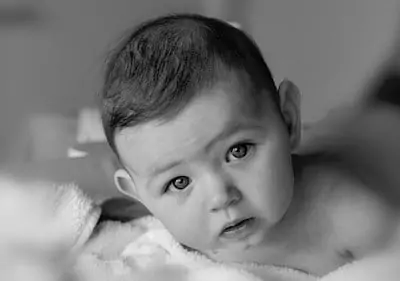Once upon a time when my eldest was a baby, we watched anxiously as other parents, we knew, announced how their babies had gotten teeth. Not our girl. She was still a gummy-smiled cutie. I could tell things were bothering her, but not one tooth ever came of it.
Then, we went to lunch at a Western-style café. My husband and I were sharing fries, and we decided to see how our girl would like them. And that when I felt the tooth. We sat crying in this café because we were so overjoyed. Finally, she had teeth. We weren’t going to need to get her dentures!
Anyway, teething does cause lots of woes, as I’d soon find out. While those days are long over, I can still recall the lack of sleep I had because of my eldest and her teething pain.
And because of that, it was MUCH easier to handle my youngest when she came along. Teething pain is worse at night, and a teething baby won’t sleep easily. So, let me share with you what I know and then some tips on how to get that teething baby crying all night to pipe down and go to sleep.
How to Tell if Your Baby is Teething
It will all begin at 3 months of age for most babies, though in our case, it was a little later. The signs you’ll find will pop up early on with no tooth in sight, which is beyond frustrating. They go through a lot of agony with this (I’ll explain that more in a minute), especially at night.
So, what symptoms does a teething baby have? You’ve got:
- More fussing and irritability
- Drool (and lots of it)
- Tugging at the ears
- Biting (which sucks when you’re the one being bitten!)
- Won’t go to sleep or stay asleep
- Hunger strike (won’t drink breast milk or bottle)
- Gums look red and swollen
Some parents will note a mild fever too. You may even mistake teething for an illness, but this is much less common, according to studies.
Is Teething Pain Worse at Night?
There’s a reason people have images of a teething baby screaming at night in their minds. That’s because teething pains are worse at night. Why is that? Interestingly, cytokines, which promote inflammation, increase in this process. These cytokines were shown to have a direct impact on sleep.
On top of that, there’s the exhaustion factor. Your baby is in pain and can’t sleep or doesn’t stay asleep, and then everything is thrown off. And that goes for you too, Mama! I know, believe me. It is tough work trying to deal with the teething.
But I have some good news for you.
Despite this seemingly never-ending cycle of exhaustion and frustration, your baby will stop feeling so affected by the pain of getting a new tooth as she gets more of them. Also, I have teething remedies at night to help you get through this teething sleep regression stage you feel trapped in. Here is more about 4-month-old sleep regression.
Whether you have a teething baby that won’t sleep unless held or one that cries all night (or both!) read on to learn how you can soothe your teething baby at night.
What Helps a Teething Baby Sleep: Teething Remedies at Night
No, you do not have to endure all the screaming and crying, and exhaustion. Save yourself and help your baby find relief with these teething tips that will help you all get more sleep. Perform these before bedtime!
- Go for a gum massage
The thing with babies, which you are now starting to figure out, is that they can’t just tell you what’s wrong. You’ll get this for a few years even after they can talk because they don’t know how to explain themselves.
With teething, you just have to think about the symptoms I mentioned earlier. One of those is swollen gums. If you suspect your little one is teething, a great way to bring relief is by providing a gentle massage to the gums. You can use your finger (as long as it’s clean and then very apply soft pressure to them).
Some parents are worried about being chomped but for everyone who has tried it, you will soon see a cranky-pants turn from growling tiger status to a subdued pussycat.
- Grab some teething toys

When a baby is teething, you’ll want to get teething toys. They make all kinds. I had the kind that was filled with water that you could freeze. I can’t remember where they came from or who made them, but they even make one that looks like a pizza slice.
You’ll find them made from plastic (BPA-free, of course), silicone, or wood. A great idea is to buy several different kinds and see which one your baby seems to favor. This way, they can get that relief by putting counter-pressure on that soon-to-emerge tooth.
- Use a frozen washcloth
Before bedtime begins, get a clean washcloth, wet it, twist it, and freeze it. Let your baby chomp on that for a bit. The cold temperature and the texture unite to help numb and cool the area, reducing inflammation and stopping the pain. We were a big fan of this one, too, for both our daughters.
While they did like the teething toys, the washcloth really helped right before bedtime. Once I started doing that, it was straightforward to get the house to sleep even with a teething baby.
- Try chilled solids too
When your baby is 6 months old and can sit up all on her own, she’s ready to try solids. And if you’ve been giving her solids to taste, it would be an excellent idea to chill some solid foods for her to gnaw on.
Chill cucumbers, carrots, pears, or apples and see how your little teether likes it. They’ll be getting some more nutrition and have something to keep them busy. This will help you get through the day with an exhausted baby who will be better poised to go to sleep at night.
- Use OTC meds
If your baby really seems to be beyond miserable despite all these tips, one thing I absolutely recommend is using OTC meds. Your baby must be over 6 months of age, but you can give acetaminophen or ibuprofen safely.
Because I am not a doctor, I recommend you call your pediatrician and get their blessing to take it. It should be fine, but that will give you peace of mind to know you’re doing the right thing. They can also help you make sure you get the dosage right.
- Try something more natural
Even with your pediatrician’s OTC medication blessing, you may feel more comfortable with homeopathic remedies instead. Some of my friends swore by essential oils for teething. I didn’t use them myself, but they are a legitimate and safe way to help teething babies.
Here’s something:
For babies ages 4 months to 7 months, you should only use chamomile or lavender essential oils. You will need to dilute it with a base vegetable carrier oil too. Never apply the essential oil directly without a carrier!
Over 6 months in age, you can use ginger or marjoram oil. And if you’re not sure how to handle all that, you can also look for teething tablets. Be very careful, though, because EVERYONE was using that Hyland’s brand and the FDA issued a stern warning about it.
If you’re not sure, read the labels on the teething tablets first and never use anything that has lidocaine, benzocaine, or belladonna in it. And if you really want peace of mind, ask your pediatrician who will undoubtedly have safe recommendations for you.
- Don’t forget about drool

I’ve spent all this time telling you about relieving teething pain for baby at night. But the drool factor is also a problem. All that slobber can irritate sensitive baby skin, dribble down to the neck and get into those little creases. Bibs are helpful for this but make sure you’re frequently wiping the baby’s face and neck off throughout the day and changing clothes when they get too drooly.
- Suck it up
Comfort for babies looks like sucking. It helps them feel safe, secure and reduces pain. If your baby isn’t on a boob-strike, nurse more often. A pacifier can help both breastfed and bottle-fed babies too.
- Give them all the cuddles
Cuddles and being with your baby will also help soothe her at night from those teething pains. Snuggle up, nurse her, talk to her, read her a story…just spend time together in a chill way, and your baby will be distracted by your calmness.
And one thing that always helped me was wearing my babies. I’d put on the baby carrier and just wear them around the house. It helped them stay calm and was an ample distraction, especially if we went for a walk.
Now that you know what helps teething babies sleep, I’d like to tackle a few FAQs I’ve received recently about soothing teething babies at night.
Should I continue sleep training while my baby is teething?
Oh, no no nooooo. Please don’t stop your sleep training if you’ve already begun it.
And if you haven’t yet, you shouldn’t stop with future incoming teeth when you get to that point.
Why?
Because it maybe 2 years or more before all those baby teeth come in. You can’t stop doing what you’re doing to sleep train your child. Merely adjust it a bit to incorporate these nighttime teething tactics instead.
What is the best pain relief for teething babies?
As I mentioned before, you may give your baby acetaminophen or ibuprofen for the pain if they are 6 months or older. And you’ll want to confirm that and the dosage with your pediatrician. It worked very well for us, though some people may find that natural remedies provide the best relief.
My advice here is to consult your pediatrician about all things OTC as well as natural and choose what’s right for your child’s specific needs. Getting that blessing from your doctor will also help you sleep better without worrying something could happen.
Yes, it is perfectly normal to run into your baby’s room and check on them because they’re too quiet. Even now that my girls are bigger, I still check on them because it’s ingrained into our Mom Brains.
Does teething affect day sleep as well?
Teething is certainly worse at night. Just like if you have an injury, allergy, or illness, your symptoms will tend to be worse when the sunsets. But that doesn’t mean your baby isn’t affected by teething in wakeful hours.
Your baby will likely wake up earlier than usual and be more difficult to put down for a nap. Again, employ the teething techniques listed above anytime your baby seems agitated. It’s a good idea to watch for the early signs, so you don’t have a full-blown screaming and crying situation to put out first.
One last thing about teething babies…
When you start putting these tips to good use and with every tooth that comes in, you will soon see a baby getting used to it. Eventually, the pain isn’t as bad, and they build up a tolerance. So hang in there and know that it will get easier soon enough. Good luck!
Leslie Berry lives with her husband and two young daughters in Los Altos, California, where she loves helping other moms get comfortable with motherhood and embracing the insanity with facts peppered with laughs.
She loves eating too much sushi, exercising, and jamming out on her Fender. Read more about Leslie here.






